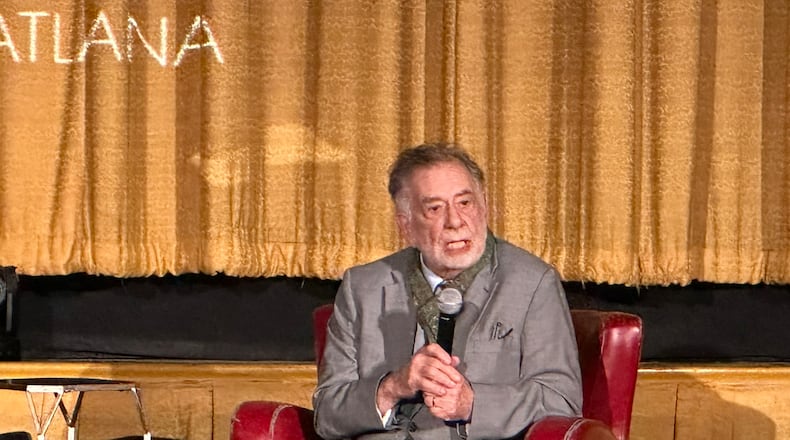Acclaimed Oscar-winning director and producer Francis Ford Coppola celebrated his 85th birthday at Atlanta’s Plaza Theatre this past weekend by holding a screening of his 1984 film “The Cotton Club” and taking questions from fans for more than 90 minutes.
Coppola has spent much of the past 18 months in metro Atlanta shooting and post-producing his self-financed sci-fi film “Megalopolis” starring Adam Driver, Giancarlo Esposito, Laurence Fishburne, Shia LeBeouf and Aubrey Plaza. He told the rapt sold-out crowd of 340 cinephiles and Coppola fans that he actually finished the final cut of the movie this past Sunday.
Two days later, the Cannes Film Festival in France committed to screening the movie on May 17.
The movie follows the rebuilding of a metropolis after an accidental destruction with an architect (Driver) competing with the mayor (Esposito).
Coppola has been working on this project on and off for more than 40 years. He sold off a portion of his wine empire to help finance the film, which The Hollywood Reporter said cost $120 million. “Megalopolis” is still seeking a distributor after a March 28 screening with potential buyers.
Before the screening of “The Cotton Club,” Coppola gave a 15-minute explanation on how he ended up doing the movie. The man behind the “Godfather” trilogy was cajoled to get involved by “The Godfather” producer Robert Evans, who needed Coppola’s name to get Orion Pictures to finance the movie. Coppola first helped to co-write the script but then ended up directing as well.
The film focuses on the famed Harlem club in the late 1920s and early 1930s and follows cornet musician Dixie Dwyer, played by Richard Gere, who accidentally ends up working for a cruel mobster (James Remar) and proceeds to fall for the mobster’s mistress (Diane Lane).
A secondary story revolves around charismatic Black tap-dancer Sandman Williams (Gregory Hines) chasing after a singer who could “pass” for white named Lila (Lonette McKee). At the time, only whites could be in the audience of the Cotton Club but the performers were all Black.
The movie was not a hit when it was released in late 1984, earning $28 million in the domestic box office on a $56 million budget.
“It was received okay,” said Coppola on stage. “This was considered one of my failures.”
He said he largely inherited Evans’ crew, which hamstrung him. “They were still loyal to him,” Coppola said, “and when that other person is hovering around, you’re in trouble.”
Evans agreed that Coppola had final say on casting including Lane and Bob Hoskins. But Evans balked when Coppola gave a key role to Fred Gwynne, who had starred in “The Munsters” nearly 20 years earlier. “I will not have a Munster in my movie!” Evans told Coppola. But Coppola won that argument.
When the film was finished, Coppola wrestled with Evans and Orion execs over the final cut. “They thought it was too long,” he said. “There are too many Black people and too much tap dancing. But the whole cast of the Cotton Club was Black. And the tap dancing was spectacular.”
But he tried his best to make them happy, cutting back the Hines storyline and the tap dancing, which he thought made the entire film “begin to wobble.”
Five years ago, Coppola on his own dime decided to remaster the film and add the 20 minutes that were taken out in 1984. He was able to extend more of the musical pieces and beef up Hines’ storyline. “I restored it,” he said. “It’s a beautiful film. If you saw ‘Chicago,’ you could see that film is a child of this film.”
Christopher Escobar, owner of the Plaza and Tara cinemas, collaborated with Coppola on the screening after first meeting him last year at a screening of 1992′s “Bram Stoker’s Dracula,” which Coppola directed. Coppola also attended last year’s fundraising gala at the Fox Theatre for the Atlanta Film Festival, which Escobar runs.
After “The Cotton Club” screening ended, Coppola took the stage at 11:20 p.m. with Escobar and told stories about his career. Escobar had planned to limit the talk to an hour but Coppola decided to take every question from the audience, extending his stay in the theater until well past 1 a.m.
“I kept trying to give him an out,” Escobar told The Atlanta Journal-Constitution on Monday. “But instead, he invited people to come closer to the stage so he could hear them better. And he had so many stories to tell. I wasn’t going to cut him off!”
Escobar said about half the audience stayed to the very end.
“He talked about the movie like it was a documentary, telling the story of the Cotton Club itself,” Escobar said. “And so many of the performers in the movie are gone now. He wanted to honor them.”
Credit: RODNEY HO/r
Credit: RODNEY HO/r
About the Author
Keep Reading
The Latest
Featured





